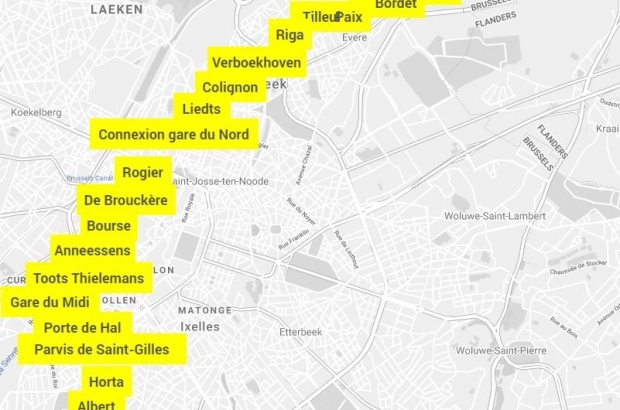- Daily & Weekly newsletters
- Buy & download The Bulletin
- Comment on our articles
Work on metro line 3 continues despite delays and finance concerns
Despite skyrocketing costs and a slew of technical problems, work on the capital’s metro line 3 will continue, according to Brieuc de Meeûs, chief executive of Brussels public transport operator Stib.
“Public transport is the lifeblood of a city,” de Meeûs said.
“That’s why it is crucial that we can maintain the service and make Stib a sustainable company that can continue to exist for many years to come. We must continue to invest, because this is the future of the region.”
While work is continuing on phase one - between Albert (Forest) and Brussels-North station - work on phase two of the metro line between Brussels-North and Bordet (Evere) has been at a standstill for some time due to technical problems.
Nevertheless, de Meeûs said that progress had been made. “People often think that we have only completed a hundred metres of tunnel, but it’s actually hundreds of metres,” he added.
“We’ve connected Tour du Midi with Palais du Midi. Work on the Albert stop is almost complete and Toots Thielemans is also progressing extremely well. Our task today is to build and complete phase one. We will continue to work unless our assignment is changed.”
De Meeûs is aware that opposition to the metro project is growing, not only among local residents but also from politicians who criticise the spiralling costs.
The total cost of the new metro line is now estimated at almost €5 billion – double the last estimate in 2021, while Brussels’ finances are in the red.
Bernard Quintin (MR), minister responsible for federal Brussels fund Beliris, has called for the works on metro line 3 to be frozen, something that outgoing Brussels budget minister Sven Gatz (Open VLD) agrees with, although he does want to complete phase one.
“We could only operate the first section and put the second on hold, but that’s difficult from an operational point of view,” de Meeûs said. Phase two is necessary in order to connect metro line 3 with the planned depot for trains, near Bordet, in Haren.
Benjamin Dalle (CD&V) and Christophe De Beukelaer (Les Engagés) have also raised questions about the continuation of metro 3, and outgoing Brussels minister Alain Maron (Ecolo) and former minister Guy Vanhengel (Open VLD) believe the work should be stopped altogether.
“We will respect the political decisions,” said de Meeûs, “but I will not comment on that debate.”
Currently, phase one of Metro 3 is expected to be completed by 2032 or even 2033.
In the meantime, Brussels' tram network has already seen some innovations, including the new tram line 10 connecting Neder-Over-Heembeek with Uccle, which sees a daily average of 80,000 journeys on weekdays.
“It’s a huge success – despite the protests against the arrival of this new line, the tram is always full,” said de Meeûs.
As doubts and tensions around metro line 3 continue to grow, federal funding that typically went to such projects has been put on hold until the formation of a Brussels government.
Brussels MPs wanted to know if the amount of federal funding could be increased in light of the complications with metro 3 construction, but mobility minister Elke Van den Brandt (Groen) said that the opposite was intended.
“The federal government will reduce the Beliris funds by €25 million,” said Van den Brandt, referring to a reduction from €125 to €100 million.
At the same time, various studies are being conducted into the financing and total discontinuation of metro line 3.
“It's not that no money can go to the metro, but in order to conclude a new agreement, we need a government with full powers – there are no urgent metro expenditure items at present,” said Veli Yüksel, spokesperson for minister Quintin, in charge of Beliris.
As the minister sees it, the €25 million reduction can be pulled from the metro 3 project, since excavation work has been halted while waiting for a permit for the demolition of the Palais du Midi.
Brussels will also have to make do with €25 million less in 2026, 2027 and 2028, and even €50 million less in 2029, according to current plans.
Consultancy firm Rebel has been commissioned by the European Investment Bank to investigate alternative financing through a public-private partnership.
Stib presented its annual report for 2024 this week. Setting aside the troublesome metro line 3, highlights for the public transport operator include a 7% rise in the number of journeys in 2024 compared to the previous year, representing a total of 402 million journeys or a distance of almost 53 million kilometres.
“This puts us almost back to pre-corona levels, especially when you consider that people are still working from home,” said de Meeûs.
“In the coming years, we expect the number of journeys to increase by 3 to 4 percent annually.”
Stib also managed to increase revenue, partly through cracking down on fare-dodgers.
The electrification of buses is also continuing, with the goal of a fully electric fleet by 2035, which will require infrastructure adaptations and charging stations at depots and terminals.


















